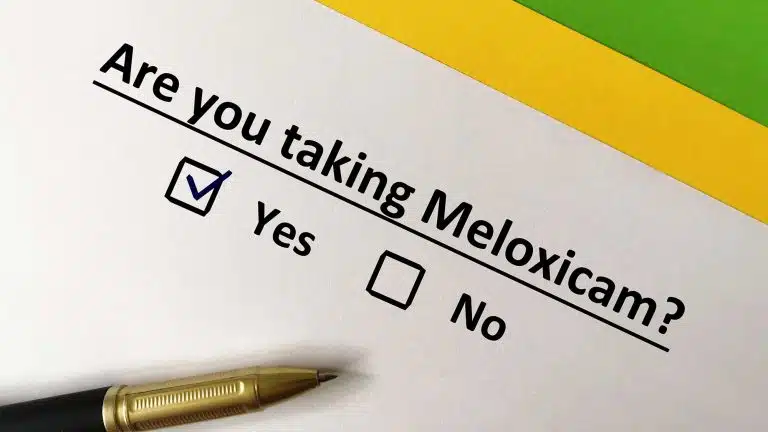Mixing Meloxicam & Alcohol | Effects & Risks
- Effects Of Meloxicam
- Effects Of Mixing Meloxicam & Alcohol
- Risks Of Mixing Meloxicam & Alcohol
- Treatment For Meloxicam & Alcohol Abuse

Taking meloxicam and alcohol together is not recommended due to the serious and potentially life-threatening side effects that may occur.
Ulcers, gastrointestinal (GI) bleeding, heart attack, and stroke can be caused by mixing this pain reliever medication with alcohol. These risks are especially heightened among seniors and elderly adults who drink alcohol while on meloxicam.
Effects Of Meloxicam
Meloxicam is a prescription drug that can be found under several brand names including Mobicand Vivlodex. It is classified as a non-steroidal anti-inflammatory drug (NSAID).
Meloxicam is used to treat pain related to arthritis (including rheumatoid arthritis and osteoarthritis), gout, and other painful conditions. It also reduces fever and inflammation.
Adverse Side Effects
Even by itself, there is an increased risk for heart attack and stroke and can lead to ulcers and gastrointestinal bleeding.
Other common side effects of meloxicam include:
- bloating
- heartburn
- diarrhea
- constipation
- dry mouth
- hair loss
- sore throat
- rapid breathing
Effects Of Mixing Meloxicam & Alcohol
Mixing meloxicam and alcohol increases the risk of serious side effects that may include:
- bleeding
- gastritis
- gout
- coffee ground-like particles in vomit
- coughing up blood
- black or tarry stool
- stomach pain
- nausea
- vomiting
- constipation
- dizziness
- high blood pressure
- diarrhea
- fluid retention
- difficulty breathing
- slurred speech
- rapid weight gain
- loss of appetite
- skin reactions like blisters, rashes, and hives
Risks Of Mixing Meloxicam & Alcohol
Drinking alcohol while on meloxicam can increase the risk of serious health problems that may include:
Gastrointestinal (GI) Bleeding
Alcohol use on its own can increase the risk of inflammation in the GI tract. With the addition of meloxicam, there is a greater risk of bleeding in the intestines.
The GI tract is not the only place this bleeding can occur. It can also happen in the stomach and the liver.
Gout
While meloxicam can help relieve the symptoms of gout, when it’s mixed with alcohol, the alcohol can cancel out any relief the meloxicam provided. The mixture also increases the risk of a gout flare and may worsen the swelling and inflammation at the joints.
Heart Attack
Alcohol by itself can cause problems with the heart, especially for people who are binge drinkers or heavy drinkers.
Meloxicam is also known to put the heart at risk and increase the chances of a heart attack and/or stroke. The FDA warns that all NSAIDs come with this risk.
Together, alcohol and meloxicam can heighten the risk of heart failure.
It’s important to watch out for the signs that a heart attack is occurring so you can get emergency help immediately:
- slurred speech
- chest pain
- nausea
- shortness of breath
- exhaustion
- arm or shoulder pain
- changes in vision
Ulcers
NSAIDs can increase the risk of stomach ulcers. These are painful sores on the lining of the stomach that can limit digestion and make you very uncomfortable. Heavy alcohol consumption can lead to ulcers as well.
When taken together, they not only increase the risk of ulcers but can make already formed ulcers even worse.
Liver Damage
While it’s well-known that alcohol can have dire effects on the liver, it’s less well-known that NSAIDs can as well. Together, they can put the liver at great risk for damage and, if left untreated, that damage can become cirrhosis and liver disease.
Kidney Problems
Meloxicam and most NSAIDs can cause acute kidney injury which can lead to chronic kidney failure. The anti-inflammatory function of meloxicam can stop the production of certain lipids that are needed for proper kidney function.
With fewer lipids, the kidneys have more trouble balancing the salt and water in the body. This can then lead to bloating and harm the kidneys in the process.
The longer an NSAID is used, the greater the risk of kidney disease. Alcohol only exacerbates the issue and increases the risk.
Overdose
When you drink alcohol and take meloxicam together, you increase the chances of an overdose. Signs of an overdose can include:
- severe stomach pain
- seizures
- coma
- lack of energy
- loss of consciousness
- blue lips, skin, or fingernails
Treatment For Meloxicam & Alcohol Abuse
While NSAIDs like meloxicam aren’t generally addictive, you may become addicted to the euphoric feeling that can occur when you mix them with alcohol.
Substance abuse treatment programs take place in an inpatient or outpatient setting and can include services as such:
To learn more, please contact us today.
Written by Ark Behavioral Health Editorial Team
©2024 Ark National Holdings, LLC. | All Rights Reserved.
This page does not provide medical advice.
American Academy of Family Physicians - Alcohol and NSAIDs Increase Risk for Upper GI Bleeding
Centers for Disease Control and Prevention (CDC) - Gout
Food and Drug Administration - Mobic
LiverTox: Clinical and Research Information on Drug-Induced Liver Injury - Meloxicam
National Library of Medicine: MedlinePlus - Meloxicam
National Library of Medicine: StatPearls - Nonsteroidal Anti-inflammatory Drugs (NSAIDs)

Questions About Treatment?
Ark Behavioral Health offers 100% confidential substance abuse assessment and treatment placement tailored to your individual needs. Achieve long-term recovery.
100% confidential. We respect your privacy.
Prefer Texting?
Our friendly support team is here to chat 24/7. Opt out any time.







 Learn More
Learn More








